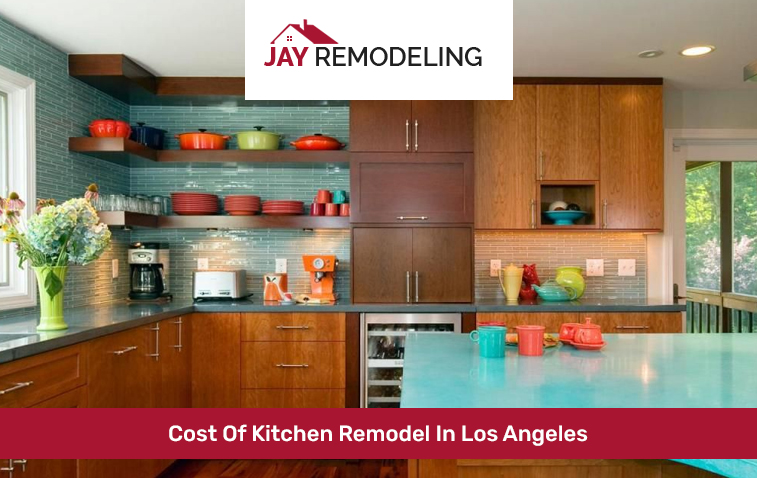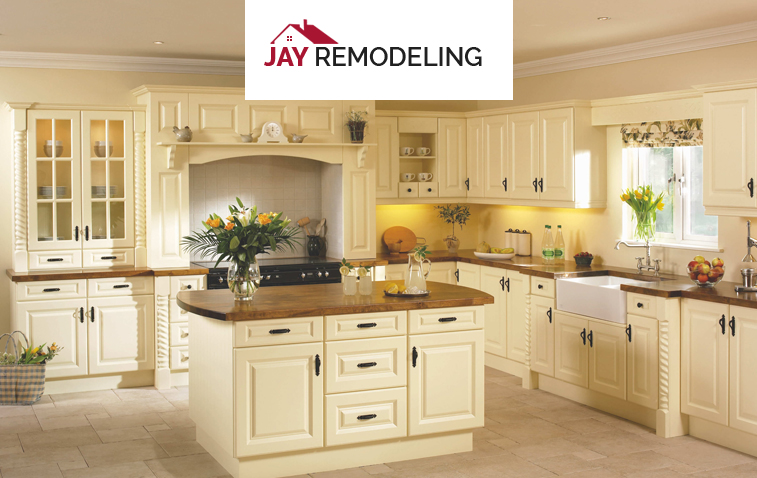Average Cost Of A Kitchen Remodel in Los Angeles
The average kitchen remodel cost in Los Angeles varies widely, typically from $35,000 to $120,000. Key factors impacting the cost include the kitchen’s size, choice of cabinets, finish level, scope of remodeling, demolition cost, plumbing and electrical changes, fixtures, and permit fees.
Are you planning to give your kitchen a makeover? One of the first things that may come to your mind is the cost. Remodels can be expensive, especially in a bustling city like Los Angeles. However, the good news is that with proper planning and research, you can know the average cost of a kitchen remodel in LA and make budget-friendly decisions.

What Is the Average Cost of A Kitchen Remodel?
In Los Angeles, the average kitchen remodel costs between $ 75 and $250 per square foot, with most homeowners spending around $150 per square foot. Thus, the estimated cost for a smaller kitchen of 70 square feet can be around $10,500 – $17,500. For a larger kitchen of about 200 square feet, the cost can rise to roughly $30,000 – $50,000.
Remember, these figures are averages; actual costs can exceed these ranges depending on your specific choices and requirements. It’s also worth considering that upscale remodels with luxurious finishes and high-end appliances can cost upwards of $80,000.
Factors Impacting the Cost of Remodel a Kitchen in Los Angeles
Several factors can impact the cost of a kitchen remodel in Los Angeles. Let’s take a look at some of the prominent ones:
Size
The size of your kitchen is one of the most significant factors that can impact the cost of a remodel. A larger kitchen requires more materials, which can increase the overall cost.
The size of your kitchen will directly influence the quantity of materials needed and the time it will take to install everything, affecting the cost. Here are some standard kitchen sizes with their corresponding cost ranges:
- Small Kitchen (70 square feet or less): Small kitchens generally cost between $10,000 and $20,000 to remodel. The limited space means less material and labor, which reduces the cost. Simple changes like replacing cabinets, countertops, and flooring can drastically improve the aesthetics and functionality of a small kitchen.
- Medium Kitchen (100 square feet): Remodeling a medium-sized kitchen generally costs between $20,000 and $40,000. Since medium kitchens offer more space, homeowners often opt for more extensive upgrades, such as adding an island, upgrading appliances, or changing the layout.
- Large Kitchen (200 square feet or more): A large kitchen remodel can cost $40,000 to $70,000 or even more. The additional space allows for high-end upgrades like custom cabinetry, professional-grade appliances, and luxury materials for the floors, countertops, and backsplash.
Kitchen Cabinets
Kitchen cabinets are another crucial aspect that can significantly affect the cost of a remodel. Your cabinets’ material, style, and size determine the final cost. Opting for custom cabinets or premium materials can substantially increase the cost.
On average, homeowners spend approximately 30% of their kitchen remodeling budget on cabinets. Here are some cabinet styles and their associated costs you might consider:
- Stock Cabinets: They come in pre-made standard sizes and are the most affordable option. Although they offer less flexibility in design, they can cost between $70 to $150 per linear foot, including installation.
- Semi-Custom Cabinets: More customizable than stock cabinets, semi-custom cabinets balance cost and personalization. They typically cost between $150 to $250 per linear foot, including installation.
- Custom Cabinets: As the name suggests, these cabinets are designed and built to your specifications. They are the most expensive option, costing anywhere from $300 to $500 per linear foot, but offer the most flexibility in terms of design and functionality.
At Jay Remodeling, we offer a variety of cabinet styles to fit your budget and aesthetic preferences. We can guide you through the entire process, from design selection to installation, ensuring you achieve the kitchen of your dreams while sticking to your budget.
Finish Level
The finish level you choose for your kitchen will also impact the cost. High-end finishes, such as granite countertops and hardwood flooring, can add to the overall cost of a remodel. On the other hand, choosing more budget-friendly options can help keep your costs down.
On average, here’s a breakdown of how finish levels can affect your kitchen remodel cost:
- Basic Level Finishes: This is the most cost-effective option, using laminate countertops, stock cabinets, and vinyl flooring. The appliances are usually budget-friendly, and there is minimal change in layout. You can expect to spend around $25,000 – $35,000.
- Mid-Level Finishes: This level includes granite or another solid-surface countertop, semi-custom cabinets, and wood or tile flooring. The appliances used here are of good quality and may have some high-end features. Consider adding a few upgrades, like a new sink or a kitchen island. The cost generally falls between $35,000 and $65,000.
- High-End Finishes: This is the most luxurious option, where you will opt for custom cabinets, quartz or granite countertops, and hardwood flooring. The appliances used here are top-of-the-line from manufacturers like Sub-Zero, Meneghini, or Vinotemp. You might also splurge on upgrades like a new layout, high-end lighting fixtures, or a wine cooler. The cost generally starts at $65,000 and can increase depending on your upgrades.
Remember that these costs are approximate and can fluctuate based on the specific materials used, the extent of the renovations, and the contractor’s fees. Planning for additional costs is always a good idea, as unexpected expenses can often arise during remodeling.
Scope
The scope of your remodel can vary widely and will impact the final cost. Moving plumbing or electrical fixtures, for example, will add to the overall cost of the remodel.
The scope of your project can range from a simple refresh to a full renovation or gut renovation. These terms are often used interchangeably but refer to different levels of work. Here’s a brief explanation of each:
- Simple Refresh: This is the most minimal level of remodeling. It might include painting the walls, replacing the sink or countertops, or upgrading the appliances. The layout remains essentially the same. This type of remodeling is the least expensive but has the most negligible impact.
- Full Renovation: A complete renovation goes deeper than a simple refresh. It may involve replacing cabinets, countertops, and appliances. The layout may change slightly, but the plumbing and electrical systems remain in their original locations. Major structural work is usually part of a partial renovation.
- Gut Renovation: A gut renovation is the most extensive and expensive level of kitchen remodeling. It involves stripping the kitchen to its bare bones and starting from scratch, including new plumbing, electrical, cabinets, countertops, and flooring. The layout can be entirely reconfigured to best suit your needs.
Each level of renovation has its costs and complexities. Before work begins, it’s essential to clarify the scope of your remodel with your contractor to ensure you both understand what is included in the project and the associated costs.
Demolition Cost
Before starting, demolition may be necessary to remove old cabinets, appliances, and flooring. The cost of demolition can vary depending on the size of your kitchen and the amount of work involved.
Demolition costs can significantly vary based on the complexity of the job and the specific tasks involved. Here are a few considerations:
- One of the first steps in a kitchen demolition is usually removing the cabinets and countertops. The cost typically ranges between $500 and $700, although it may be higher if the kitchen is larger or the cabinets are difficult to remove.
- Tearing Down Walls: If your remodel includes opening up your kitchen space or changing the layout, wall demolition might be necessary. This can cost between $300 to $500 for non-load-bearing walls and up to $3000 for load-bearing walls.
- Removing Appliances: The cost of eliminating appliances depends on their size, weight, and location. On average, this can cost between $100 and $200.
- Flooring Removal: Depending on the type and condition of your existing floor, this can range from $200 to $500.
Plumbing & Electrical
If you plan to update your plumbing or electrical fixtures, the cost of a remodel can significantly increase. It is crucial to factor in these costs when planning your budget.
When considering the plumbing and electrical aspects of a kitchen remodel, costs can vary significantly based on the work to be done:
- Updating Electrical Wiring: If your kitchen has outdated wiring or if you’re redesigning the kitchen layout and need outlets moved, the cost of electrical work will increase. The cost for this type of project can range from $3,000 up to $5,000. However, it’s a critical expenditure considering the significant safety benefits of modern, up-to-code electrical systems.
- Adding New Plumbing Lines: If you’re adding a new sink, dishwasher, or refrigerator with a water line, new plumbing lines will need to be installed. Depending on the project’s complexity, plumbing costs could range from $450 to $1,800 per fixture.
- Replacing Old Pipes: Old pipes can cause many problems, from leaks to impaired water quality. Depending on the extent of the problem and the size of your kitchen, replacing these can cost anywhere from $ 1,000 to $ 4,000.
- Upgrading Fixtures: High-end faucets, sinks, and light fixtures can quickly increase the cost. While you can find fixtures at lower prices, designer or custom fixtures can cost several hundred to several thousand dollars.
- Installing New Lighting: Recessed lighting, pendant lights, or under-cabinet lighting can significantly improve your kitchen’s usability and aesthetics. The cost, including materials and installation, can range from $200 to $500 per light.

Permits
In Los Angeles, permits are required for most kitchen remodels. The cost of permits can range from a few hundred dollars to over a thousand dollars, depending on the scope of your project.
Permit costs can vary widely based on the extent of the project and the specific regulations of your city or county. In general, the more extensive the remodel, the more costly the permits. Here’s a breakdown of potential permit costs you might encounter:
- Essential Permits: These are required for straightforward remodels that involve cosmetic changes, such as replacing countertops or cabinets. These generally cost between $200 and $400.
- Mechanical permits: These are required when changes are made to the electrical, plumbing, or HVAC systems. A separate permit may be required for each, and the costs can range from $50 to $500 each.
- Structural Permits: A structural permit will be required if the remodel involves structural changes to your home, such as removing walls or adding square footage. These are typically the most expensive permits, ranging from $500 to $2,000.
- Plan Review Fees: Some cities require a plan review before issuing permits. This additional cost can range from $100 to $500, depending on the complexity of the remodel.
When planning, it’s crucial to appreciate the importance of permits. Beyond being a legal requirement, permits ensure that your remodel meets safety standards and will comply with your city’s regulations. While the range of costs can be vast, understanding what you need and their associated costs will help prevent unexpected expenses and delays later.
If you need assistance understanding the permitting process or want to discuss your kitchen remodel project in Los Angeles, our team is here to help. You can reach us at (424) 327-8743. We have extensive experience navigating the permit processes and can guide you to ensure a smooth renovation experience.
Conclusion
When considering a kitchen remodel in Los Angeles, it’s essential to understand the various factors that can impact the overall cost. Each decision, from the size of your kitchen to the types of materials and finishes you choose, can significantly affect your budget. Planning carefully and considering all potential expenses, including demolition, plumbing and electrical work, fixtures, and permits, is crucial.

